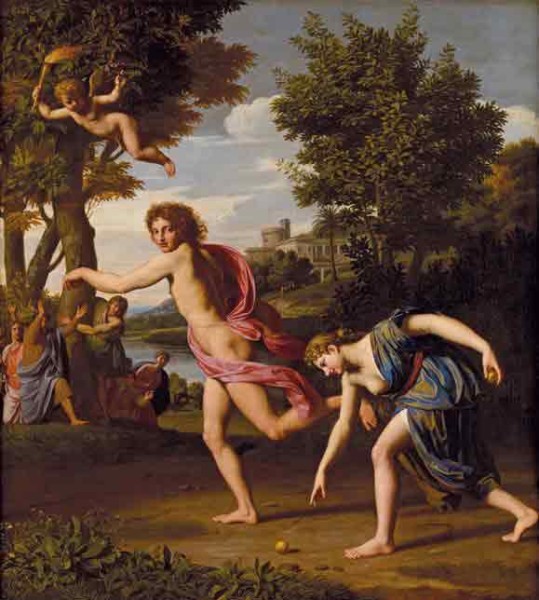Who was the Atalanta of Micheal Maier’s Atalanta Fugiens?

The Race between Atalanta and Hippomenes, by Nicolas Colombel (1644-1717)
Information and Links about the Myth of Atalanta
From Theoi
ATALANTA was a great Arkadian huntress and a favourite of the goddess Artemis. She was exposed by her father in the wilderness at birth, but was suckled by a she-bear and afterwards found and raised by hunters. She swore to the goddess to defend her virginity and, when two Kentauroi (Centaurs) burst into her grove, destroyed them with her arrows. Later she participated in the voyage of the Argonauts, and defeated the hero Peleus in wrestling at the funeral games of King Pelias. When Meleagros gathered heroes to destroy the Kalydonian Boar, Atalanta joined the hunt and was the first to draw blood. Meleagros awarded her the prize of the skin, and when his uncles tried to take it from her force, he slew them. Atalanta was later reunited with her father Skhoineus (or Iasios), who insisted that she be wed. She agreed, but on condition that the suitors must defeat her in a race, and that the losers should be put to death. Hippomenes or Melanion, however, sought the help of the goddess Aphrodite who presented him with three golden apples to cast before the girl in the race. When Atalanta stooped to retrieve these, she was slowed enough to allow the hero to emerge victorious. Their marriage was a short-lived one, for Hippomenes neglected to pay Aphrodite her dues, and was cursed to lay with Atalanta in the sacred precinct of Zeus, Rhea or Artemis where the pair were transformed into lions.
Atalanta’s name was derived from the Greek word atalantos, meaning “equal in weight.” She was one of several famous huntresses in Greek mythology, others included Britomartis, Kallisto, Kyrene and Prokris.
From The Rosecrucian Alchemy Museum
Atalanta Fugiens means, Atalanta Fleeting:
Atalanta is a mythological figure that was written about in Ovid’s Metamorphoses. She was a beautiful madien who was very quick on her feet so she could flee from her many suitors. She had been warned that if she settled with one, that she would lose the nature of her being. Therefore to kept her suitors to a minimum, she challenged each of her suitors to a race, and if they lost the race against her they would be killed.The Grandson of Neptune, Hippomenes took her up on her challenge, yet before the race begun he obtained three golden apples from Venus, who told him to place the apples on the ground in the crucial moments of the race. So, each time the Atalanta was gaining on him, he would drop an apple, and she would stop and pick it up causing her to lose the race. Rejoicing in his triumph he took Atalanta into the temple of the mother goddess to make her his bride. This did not please the mother goddess and in her rage she turned both of them into lions.
The Alchemical symbol of this story is found in the chemical rivalry of sulfur (symbolized by the male Hippomenes) and mercury (symbolized by the female Atalanta), and the fixity of both of these elements, symbolized by the lions (the alchemical red lion).
Atalanta is one of the symbols used in alchemy for quicksilver, this evasive and fast moving metal which the alchemist must fix in order to make use of its properties. Other symbols for quicksilver include, a deer, a bee, and the green lion.
From an Alchemical Viewpoint: Atalanta Fugiens and the Golden Apples
Atalanta Fugiens picking up golden apples loses her a running race, but just a percentage of alchemical ways can fit this volatile fixation model.
Too many hermetic authors have been using this myth as an allegory to explain volatile fixation, but are they fair when saying metallic gold is the unique method to slow down an excessively fast girl?
Michael Maier entitles his Emblemata Nova de Secretis Naturae Chymica, 1618, after a particular episode in Atalanta myth: Goddess Atalanta, who in greek-roman culture is often assimilated into the mainstream of hunting female deities, is the most fast running and one day taking exercise she feels herself suffering from a violent thirst in nearby an Aesculapius temple. So she strickes a rock and brings forth a spring of fresh water, which she is drinking. From this introduction we are allowed to see her as our Mercurius: hunter, so looking for victims to dissolve. Fast running, fugiens in latin, so too much volatile. Bringing forth water from rocks, in so doing exactly as our Universal Dissolvent/Mercurial Water extracting Secret Fire/Waters from minerals to get them unified with Waters from above. Hortulus Hermeticus engraving number 29, on the right, provides a good representation of the concept. (More)
